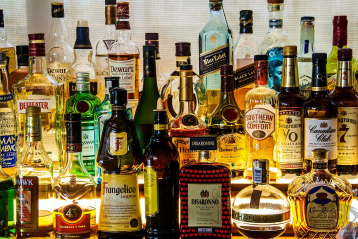Some 16.4 percent of breast cancers in women were attributable to alcohol consumption.*
“Cigarette smoking accounts for the highest proportion of cancer cases and deaths. That is followed by excess body weight and alcohol intake,”
Jesse Slome, director of the American Association of Critical Illness Insurance
Reduce cancer risk avoid alcohol, June 10, 2020: Updated cancer prevention guidelines released yesterday by the American Cancer Society (ACS) should be of interest to all American adults. ACS recommends that “it is best not to drink alcohol.”
Alcoholic beverage consumption caused 5.6% of all incident cancer cases and 4% of all cancer deaths among males and females in the United States. The data comes from this November 2017 report.
Also attributable to alcohol consumption are an estimated 40.9% of oral cavity/pharynx cancers. In addition, 23.2% of larynx cancers, 21.6% of liver cancers, 21% of esophageal cancers, and 12.8% of colorectal cancers (2014 data). Among women, 16.4% (ie, 39,060) of all breast cancers were attributable to alcohol consumption.
Reduce cancer risk avoid alcohol, follow new ACS guidelines
The new guidelines are the first to address the issue since 2012. Those guidelines recommended that alcoholic beverage intake should be no more than one drink per day for women. It should be no more than two drinks per day for men. The Cancer Society notes that the recommendation is still in place. However it is now accompanied by this new, stronger directive.
Alcohol consumption is an established cause of at least seven types of cancer according to the report. An expert working group convened in 1987 first classified the consumption of alcoholic beverages as carcinogenic to humans. The evidence for causality was found to be sufficient for cancers. They include oral cavity, pharynx, larynx, squamous cell carcinoma of the esophagus and liver.
Alcohol consumption causes liver cancer and could be connected to colorectal and female breast cancers. This according to a second expert working group that convened in 2007. The researchers for ACS noted that alcohol consumption also interacts synergistically with tobacco use. The result is an increase in the risk of cancers that is considerably more than the risk associated with either drinking alcohol or tobacco use alone.
“The guidelines show that consumption of any amount of alcohol increases risk of some types of cancer, most notably breast cancer,” states Jesse Slome, director of the American Association for Critical Illness Insurance . “Cigarette smoking accounts for the highest proportion of cancer cases (19.0%) and deaths (28.8%). Excess body weight (7.8% and 6.5%, respectively) and alcohol intake (5.6% and 4.0%, respectively) are next in line.”
Importance of supplemental health insurance as part of cancer planning
“One American will be diagnosed with cancer every 21 seconds,” shares Slome. “When that happens, even the best health insurance policies very likely will not cover all expenses. And, of course, most people will miss paychecks because they need to take time off from work to undergo treatments.”
Slome recommends that individuals age 40 and older consider a small amount of cancer insurance coverage. “Today you need to supplement the gaps in your health insurance plan. Check out the cost for specific cancer-only coverage equal to between six and 18 months of your rent or mortgage payments.” According to AACII a growing number of critical illness insurance plans now include a separate cancer insurance only plan option. “For a relatively few dollars each month, you’ll find the greatest options,” Slome explains. “Today a growing number of companies will allow you to apply directly online from the comfort of your home.”
AACII offers a checklist of questions for those offered employer critical illness insurance at work. Ascertain if you are getting the right coverage for the best cost. For additional information consult the Association’s website or call 818-597-3205 to learn more.

* Source. American Cancer Society, ACS Journal
Photo Source: Image by Michelle Bryant from Pixabay
Links to additional resources recommended by AACII
The American Association for Critical Illness Insurance maintains a Facebook informational page. There you can find the latest health news related to cancer, heart attacks and strokes. Click here to access and subscribe.


